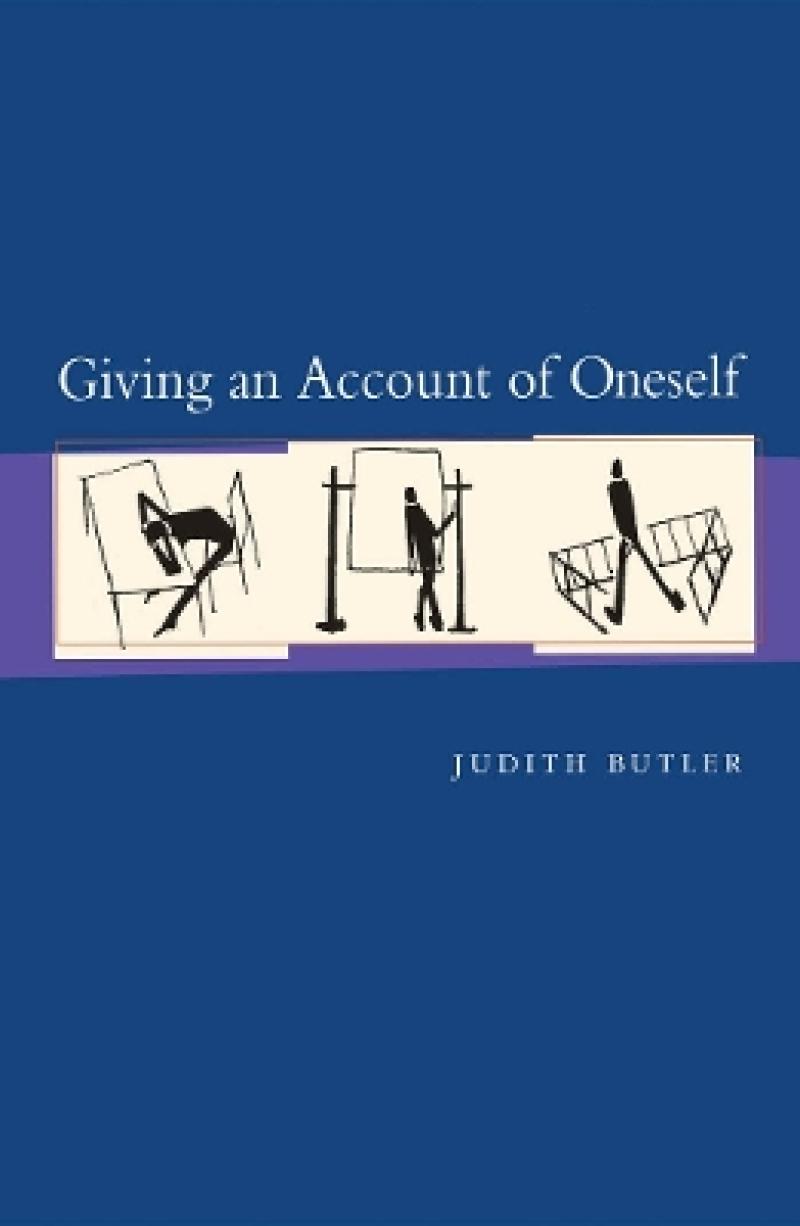What does it mean to lead a moral life?
In her first extended study of moral philosophy, Judith Butler offers a provocative outline for a new ethical practice—one responsive to the need for critical autonomy and grounded in a new sense of the human subject.
Butler takes as her starting point one’s ability to answer the questions “What have I done?” and “What ought I to do?” She shows that these question can be answered only by asking a prior question, “Who is this ‘I’ who is under an obligation to give an account of itself and to act in certain ways?” Because I find that I cannot give an account of myself without accounting for the social conditions under which I emerge, ethical reflection requires a turn to social theory.
In three powerfully crafted and lucidly written chapters, Butler demonstrates how difficult it is to give an account of oneself, and how this lack of self-transparency and narratibility is crucial to an ethical understanding of the human. In brilliant dialogue with Adorno, Levinas, Foucault, and other thinkers, she eloquently argues the limits, possibilities, and dangers of contemporary ethical thought.
Butler offers a critique of the moral self, arguing that the transparent, rational, and continuous ethical subject is an impossible construct that seeks to deny the specificity of what it is to be human. We can know ourselves only incompletely, and only in relation to a broader social world that has always preceded us and already shaped us in ways we cannot grasp. If inevitably we are partially opaque to ourselves, how can giving an account of ourselves define the ethical act? And doesn’t an ethical system that holds us impossibly accountable for full self-knowledge and self-consistency inflict a kind of psychic violence, leading to a culture of self-beratement and cruelty? How does the turn to social theory offer us a chance to understand the specifically social character of our own unknowingness about ourselves?
In this invaluable book, by recasting ethics as a project in which being ethical means becoming critical of norms under which we are asked to act, but which we can never fully choose, Butler illuminates what it means for us as “fallible creatures” to create and share an ethics of vulnerability, humility, and ethical responsiveness.
Les mer
What does it mean to lead an ethical life under vexed social and linguistic conditions? In her first extended study of moral philosophy, Judith Butler offers a provocative outline for a new ethical practice -one responsive to the need for critical autonomy yet grounded in the opacity of the human subject.
Les mer
"A powerful exploration of the intersection of identity and responsibility, Giving an Account of Oneself shows us Judith Butler at her best, in dialogue with some of the other foremost thinkers of our age: Adorno, Foucault, Levinas, and Laplanche. Confronting the problem of identities that emerge only in relation to social and moral norms they may seek to contest, she proposes a rethinking of responsibility in relation to the limits of self-understanding that make us human." -- -Jonathan Culler Cornell University "A brave book by a courageous thinker." -- -Hayden White University of California and Stanford University "In stunningly original interpretations of Adorno and Levinas, ...Judith Butler compellingly demonstrates that questions of ethics cannot avoid addressing the moral self's complicity with violence. By laying out the premises of a creative rereading, this study proves that the discussion of these two authors and their future legacy has, in a sense, barely begun. Butler writes in a truly Spinozistic spirit, mobilizing the greatest forces and joys of philosophical intelligence to counteract and redirect the cruelest and most destructive of human passions. Brilliantly argued and beautifully written, Giving an Account of Oneself is destined to become a classic, a must read for philosophers and students of present-day culture and politics alike." -- -Hent de Vries The Johns Hopkins University "In a time when moral certitude is used to justify the worst violence, Butler's nuanced reworking of what it means to be ethically responsible to ourselves and to others is welcome indeed." -- -Drucilla Cornell Rutgers University
Les mer
A powerful exploration of the intersection of identity and responsibility, Giving an Account of Oneself shows us Judith Butler at her best, in dialogue with some of the other foremost thinkers of our age: Adorno, Foucault, Levinas, and Laplanche. Confronting the problem of identities that emerge only in relation to social and moral norms they may seek to contest, she proposes a rethinking of responsibility in relation to the limits of self-understanding that make us human.---—Jonathan Culler, Cornell University
Les mer
Produktdetaljer
ISBN
9780823225040
Publisert
2005-10-01
Utgiver
Vendor
Fordham University Press
Høyde
229 mm
Bredde
152 mm
Aldersnivå
P, 06
Språk
Product language
Engelsk
Format
Product format
Heftet
Antall sider
160
Forfatter
